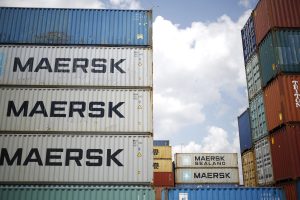Introduction In recent years, blockchain technology has emerged as a transformative force across various industries, including finance, healthcare, and supply chain management. Among these sectors, global trade stands out as a particularly promising area for blockchain implementation. The role of blockchain in global trade is multifaceted, offering solutions to longstanding challenges such as inefficiency, fraud,
Introduction
In recent years, blockchain technology has emerged as a transformative force across various industries, including finance, healthcare, and supply chain management. Among these sectors, global trade stands out as a particularly promising area for blockchain implementation. The role of blockchain in global trade is multifaceted, offering solutions to longstanding challenges such as inefficiency, fraud, and lack of transparency. This article explores the various ways blockchain technology is revolutionizing global trade, providing an informative overview of its potential benefits and challenges.
Understanding Blockchain Technology
Before delving into its impact on global trade, it’s essential to understand what blockchain technology entails. At its core, blockchain is a decentralized digital ledger that records transactions across multiple computers in such a way that the registered transactions cannot be altered retroactively. This ensures transparency and security, making blockchain an ideal solution for industries requiring robust data integrity.
Key Features of Blockchain

Image by: Google.com
1. Decentralization: Unlike traditional centralized databases, blockchain operates on a network of computers (nodes), reducing the risk of a single point of failure.
2. Transparency: All transactions are visible to all participants in the network, promoting accountability.
3. Security: Cryptographic techniques ensure that data is tamper-proof.
4. Immutability: Once recorded, data cannot be altered or deleted, ensuring a permanent and unchangeable record.
The Current State of Global Trade
Global trade is a complex ecosystem involving multiple stakeholders, including manufacturers, suppliers, logistics providers, customs authorities, and financial institutions. This complexity often leads to inefficiencies, delays, and increased costs. Traditional systems rely heavily on paper-based processes and intermediaries, making them susceptible to errors and fraud.
Challenges in Global Trade
1. Inefficiency: Manual paperwork and multiple intermediaries slow down processes.
2. Lack of Transparency: Limited visibility into the supply chain makes it difficult to track goods and verify authenticity.
3. Fraud: Counterfeit goods and fraudulent transactions are prevalent issues.
4. High Costs: Intermediaries and manual processes increase operational costs.
The Role of Blockchain in Addressing Trade Challenges

Image by: Google.com
Blockchain technology offers solutions to many of the challenges faced by global trade. By leveraging its key features, blockchain can streamline processes, enhance transparency, and reduce costs.
- Enhancing Transparency and Traceability
One of the most significant advantages of blockchain in global trade is its ability to provide end-to-end visibility. Every transaction is recorded on a public ledger, making it easy to trace the journey of goods from the manufacturer to the end consumer. This transparency helps in verifying the authenticity of products, reducing the risk of counterfeit goods entering the supply chain.
- Reducing Fraud
Blockchain’s immutable nature makes it nearly impossible to alter transaction records. This feature is particularly beneficial in combating fraud. For instance, smart contracts self-executing contracts with the terms directly written into code can automate and enforce contractual agreements, reducing the need for intermediaries and minimizing the risk of fraudulent activities. - Streamlining Processes
Blockchain can automate various aspects of global trade, from documentation to payment processing. Smart contracts can trigger automatic payments once predefined conditions are met, reducing the need for manual intervention and speeding up transactions. This automation can significantly reduce delays and improve overall efficiency.
- Lowering Costs
By eliminating intermediaries and reducing the need for manual processes, blockchain can lower operational costs. For example, traditional trade finance involves multiple banks and financial institutions, each adding their fees. Blockchain can streamline these processes, reducing the need for intermediaries and associated costs.
Case Studies: Blockchain in Action

Image by: Google.com
Several organizations and consortia are already exploring the role of blockchain in global trade. Here are a few notable examples:
- Maersk and IBM: Trade Lens
Trade Lens is a blockchain-based platform developed by Maersk and IBM to digitize the global supply chain. The platform aims to enhance transparency and efficiency by providing real-time access to shipping data. Since its launch, Trade Lens has onboarded numerous ports, shipping lines, and logistics providers, demonstrating the potential of blockchain in transforming global trade.
- HSBC and ING: Trade Finance
HSBC and ING successfully executed a live trade finance transaction using blockchain. The transaction involved a shipment of soybeans from Argentina to Malaysia and was completed in 24 hours, compared to the traditional 5-10 days. This case study highlights how blockchain can streamline trade finance, reducing time and costs.
- Walmart: Food Safety
Walmart has implemented blockchain to improve food safety in its supply chain. By leveraging blockchain, Walmart can trace the origin of food products in seconds, enhancing transparency and enabling quicker responses to food safety incidents.
Challenges and Considerations

Image by: Google.com
While the role of blockchain in global trade is promising, several challenges and considerations need to be addressed for widespread adoption.
- Scalability
Blockchain networks need to handle a high volume of transactions efficiently. Current blockchain technologies face scalability issues, which could limit their ability to support global trade.
- Interoperability
For blockchain to be effective in global trade, different blockchain platforms must be able to communicate and share data seamlessly. Achieving interoperability between various systems is a significant challenge.
- Regulatory Compliance
Global trade is subject to various regulations and standards. Ensuring that blockchain solutions comply with these regulations is crucial for their adoption.
- Security Risks
While blockchain is inherently secure, it is not immune to cyber threats. Ensuring robust security measures are in place is essential to protect sensitive trade data.
The Future of Blockchain in Global Trade
Despite the challenges, the future of blockchain in global trade looks promising. As technology matures and scalability and interoperability issues are addressed, blockchain has the potential to become a cornerstone of global trade.
Emerging Trends
1. Consortia and Partnerships: Collaboration between industry players will drive the development and adoption of blockchain solutions.
2. Integration with IoT: Combining blockchain with the Internet of Things (IoT) can enhance supply chain visibility and traceability.
3. Government Initiatives: Governments worldwide are exploring blockchain for trade facilitation, which could accelerate its adoption.
Conclusion
The role of blockchain in global trade is transformative, offering solutions to long-standing challenges such as inefficiency, fraud, and lack of transparency. By enhancing traceability, reducing fraud, streamlining processes, and lowering costs, blockchain has the potential to revolutionize global trade. However, addressing scalability, interoperability, regulatory compliance, and security challenges is crucial for its widespread adoption. As technology evolves and industry collaboration increases, blockchain is poised to become a fundamental component of the global trade ecosystem.
















